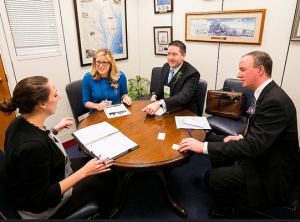
Clarifying the definition of seasonal workers in the ACA was among the issues floral industry members advocated for during SAF’s 2015 Congressional Action Days. Pictured: Kaitlin Radebaugh, Radebaugh Florist & Greenhouses in Towson, Maryland, Skip Paal, AAF, of Rutland Beard Floral Group in Catonsville, Maryland, and Dan Sieck, Sieck Wholesale Florist Group with various mid Atlantic locations.
A “minor fix” to the Affordable Care Act that could result in thousands of dollars of savings for some U.S. small businesses is also giving some people hope that additional changes to the law could become a reality.
The Protecting Affordable Coverage for Employees (PACE) Act, signed into law in early October, gives states the ability to decide how to classify businesses of 51 to 100 employees, potentially saving premiums for small business employees, according to an estimate from the consulting firm Oliver Wyman. Under the original ACA, small businesses of less than 50 employees had their own special rules requiring specific types of coverage with a higher cost to employers. Beginning in 2016, those special rules were scheduled to apply to small businesses of 51 to 100 employees.
In coordination with other groups, SAF has been pushing for such technical fixes to the ACA. Last year during Congressional Action Days in Washington, D.C., SAF members told lawmakers about the challenges posed by the law’s definition of seasonal and full-time work. The passage of PACE, is a welcome sign of progress surrounding a law remains a highly charged partisan issue, said Shawn McBurney, SAF’s senior director of government relations.
“For years, Republicans were committed to a full repeal of the ACA,” he said. “They had no interest in making small changes to a law they thought would only crumble under its own weight. Democrats were opposed to making any changes to the law believing that doing so would tacitly admit shortcomings in it and might make it vulnerable to significant legislative attacks.”
In meetings with leadership and committee offices on Capitol Hill about the ACA, McBurney said, SAF was informed that for any change to be considered it would have to be non-controversial, bipartisan, and have bills in both the House and Senate introduced. That’s exactly what happened with PACE, he explained. The bill passed unanimously.
“There are a lot of things in the bill that need fixing. I’m for repeal and replace,” Brett Guthrie (R-Ky.), the sponsor of PACE, told USA Today. “But here’s the situation: You have people being negatively affected, and so can we find a way to work together to fix it? Sometimes it’s not about who has the biggest lobbying firm. It’s when you have grassroots people who say they’re being negatively affected. … And this affects businesses every congressional district in the country.”
USA Today also reported that, since the Affordable Care Act was first passed along party lines in 2010, President Obama has signed at least 14 bills making substantive changes in his signature legislation of his presidency, according to an analysis by the Congressional Research Service. Eight of those have been Republican bills.
McBurney said the passage of PACE gives even more momentum for the SAF-backed Simplifying Technical Aspects Regarding Seasonality (STARS) Act, which would define “seasonal employee” as a worker who is employed on a seasonal basis for six months or less during a calendar year, consistent with Department of Treasury regulations. The act also would simplify the methods for seasonal employers to determine business size and ultimately whether the business and seasonal employees are subject to required offers of coverage under the ACA’s employer mandate.
In fact, SAF has been meeting with offices on both sides of the Capitol for months obtaining support for the legislation, McBurney said. H.R. 863 in the House has attracted 69 cosponsors, 43 of them since Congressional Action Days, when SAF member took the issue to the Hill. In the Senate, S. 1809 was introduced by Sens. Kelly Ayotte (R-N.H.) and Angus King (I-Maine).
“The SAF-led seasonal employers coalition continues to meet with congressional offices and has received positive feedback on our efforts,” McBurney said. “Those efforts will continue until the STARS Act is enacted.



